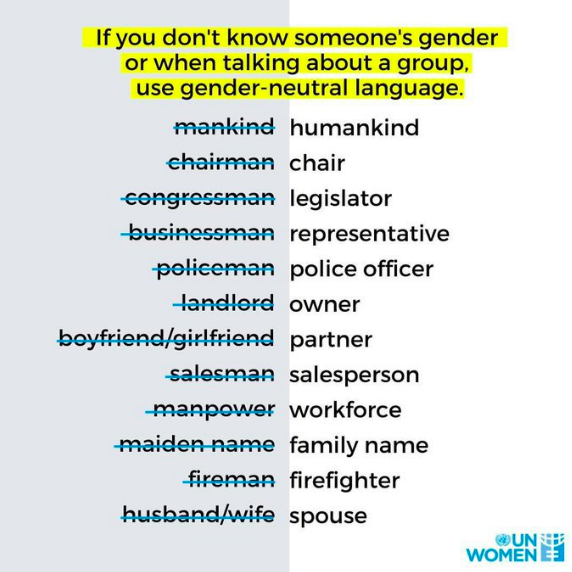George Orwell popularised the word ‘thoughtcrime’, but he also wrote extensively about the destruction of language. This week, the United Nations has been playing that worrying game, of meddling with what people say.
‘What you say matters’, the UN wrote in a tweet. ‘Help create a more equal world by using gender-neutral language if you’re unsure about someone’s gender or are referring to a group,’ its Twitter account urged, telling people to substitute words like ‘mankind’ for ‘humankind’, ‘maiden name’ for ‘family name’ and ‘businessman’ for ‘representative’.
There is nothing bad, of course, about trying not to offend people. But there is something deeply troubling about adapting language in a way that dilutes meaning. And is it really the UN’s place to try and police what people say?
Like the compilers of the Newspeak dictionary, the UN seem to have expanded its mission to remove words from the lexicon, or at least until we are sure about someone’s gender.

It used to be simple. We observed someone’s sex and took it from there. Transgender people like me made our wishes clear, generally by presenting ourselves in the way that we wished to be seen. But sex is frowned on these days. The preferred word is now gender, and our gender is not self-evident. And if it’s not evident we might not use the right word.
To avoid upsetting the prickly and the precious, the UN took the blue pencil to words we used to take for granted: husband, wife, boyfriend, girlfriend are out; partner and spouse are in. But this is not how language works. Language mediates understanding; if we don’t have words to encapsulate an idea, we can’t share those ideas. As it was explained to Winston Smith in 1984,
‘Don’t you see that the whole aim of Newspeak is to narrow the range of thought? In the end we shall make thought-crime literally impossible, because there will be no words in which to express it.’
English is such a rich language because it draws from so many different traditions and places, both in history – from Old English, Norse and French, for example – and geography. Words created by English speakers anywhere in the world can be shared with billions. With nothing equivalent to the Académie Française to hold it back, English is versatile and dynamic, creating new vocabulary: synonyms that are not quite synonymous to allow not only precision of language but nuance of thought.
Which brings us back to the United Nations. Gender-neutral terms contribute to the richness of the language when they are added to the language. But the strong visual message from the UN’s message is subtraction and deletion. ‘Owner’ is in, but does ‘landlord’ really need to go?
There are times when gendered language conveys unhelpful assumptions that could be wrong. If I reported, for example, that six policemen knocked on my door at six am, the assumption might be made that they were all men. The suggested alternative – police officer – does not.
Whether we like it or not, gendered language has a purpose; it conveys information, and we delete it at our peril. I have a spouse but she is my wife, not my husband. She had a maiden name, and everyone knows what that means. In our asymmetric society where members of only one sex tend to change their name on marriage, it’s not surprising that the terminology is gender-specific. The replacement suggested by the UN (family name) adds confusion not clarity. Worse it obfuscates sexism. If women are expected to do something that men are not – take on someone else’s name in place of the one they had from birth – then we at least need the words to describe it. Removing the words to describe sexist discrimination does not improve the conditions for women, it merely removes their ability to describe the problem.
The whole agenda, of course, is driven by the gender ideology that is plaguing our society. The philosophy that declares that being a woman or a man, or neither, is a feeling in our heads. An identity that we can choose to adopt, rather like choosing which football team to support. But our sex is a matter of our biology and not something we can change.
So, yes, let’s add new language for people who don’t want to be constrained, and for when we want to be inclusive of both sexes (there are only two). Let’s allow language to develop, but edicts from the top – from the UN, no less – to delete words are not going to make society any more inclusive. Instead they merely make it harder for us to name the problem.







Comments